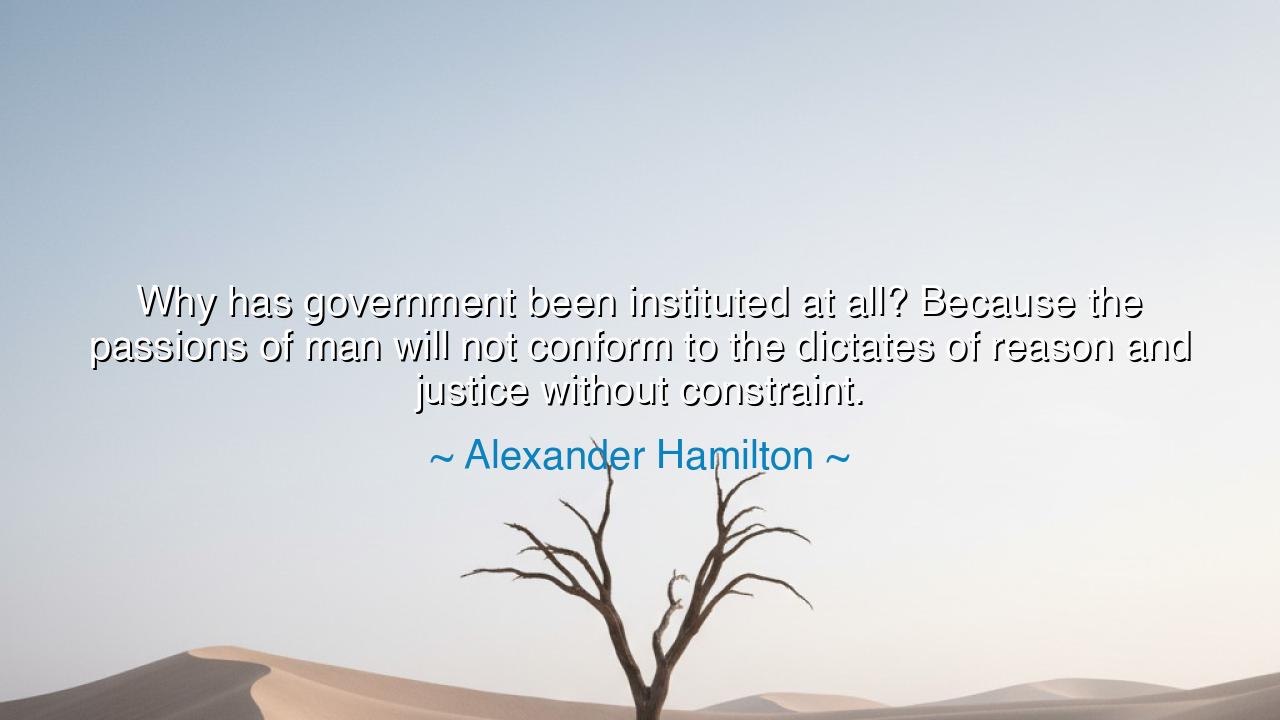
Why has government been instituted at all? Because the passions
Why has government been instituted at all? Because the passions of man will not conform to the dictates of reason and justice without constraint.






"Why has government been instituted at all? Because the passions of man will not conform to the dictates of reason and justice without constraint." – Alexander Hamilton
In these solemn words, Alexander Hamilton, one of the architects of the American republic, speaks with the gravity of one who has looked deeply into the heart of mankind. His statement is not a condemnation of humanity, but a recognition of its dual nature—its capacity for greatness and its inclination toward chaos. Hamilton understood that the same fire that drives human ambition can also consume societies when left unchecked. Government, he said, was not born of arrogance but of necessity. It exists not to crush freedom, but to balance it with the discipline of law, so that liberty might endure beyond the whims of passion.
The origin of this thought lies in the age of revolution and constitution-making, when the newborn United States stood on the precipice of anarchy. The Articles of Confederation had failed to hold the young nation together; rebellion and faction threatened to tear it apart. In those turbulent years, Hamilton and his fellow Federalists—men like Madison and Washington—saw that liberty without order becomes self-destruction. Thus, they sought to craft a government strong enough to restrain the darker impulses of man, yet wise enough to protect his rights. This quote captures Hamilton’s lifelong conviction: that reason must rule passion, or passion will devour reason.
History has proven his warning true countless times. When the flames of passion rise ungoverned by justice, nations fall into ruin. Consider the French Revolution—born of noble ideals, yet consumed by vengeance and blood. What began as a cry for liberty descended into the Reign of Terror, where reason bowed before rage. The people overthrew tyranny only to enthrone another form of it, because they had cast away all constraint. The guillotine became the altar of their passion, and on it, they sacrificed the very freedom they sought to win. Hamilton’s words foretell this truth: that without moral and civic restraint, passion becomes a destroyer disguised as liberation.
Yet Hamilton did not despise passion. He himself was a man of immense drive, fierce pride, and unrelenting will. He knew that passion, properly guided, was the engine of progress, invention, and courage. What he feared was passion unchained from conscience—that wild force which blinds men to truth and justice. Government, in his vision, was the great harness that tames this energy, channeling it into the building of civilization rather than its ruin. The rule of law, therefore, is not a cage for the human spirit, but its protector; for without structure, freedom collapses into chaos, and chaos breeds tyranny.
A living example of Hamilton’s insight can be found in the fall of Rome. The Roman Republic, built on civic duty and restraint, gave way to empire when corruption and ambition overtook its citizens. As reason gave way to indulgence, as senators sought power over principle, the republic decayed from within. The emperors who followed ruled not through justice, but through fear—proving that when men abandon self-discipline, they summon despotism to replace it. The lesson is ancient, yet eternal: that without moral governance, humanity becomes its own oppressor.
Hamilton’s wisdom also speaks to the inner realm of the soul. Each of us, like the state, is governed by both passion and reason. Our own “government” must be instituted within—the discipline that keeps desire from enslaving the mind. Without the constraint of self-mastery, we are no freer than a mob driven by fury. The same principles that hold a nation together—law, justice, and order—are the very principles that preserve the integrity of one’s character. The external government is but a reflection of the internal one.
The lesson, therefore, is profound and timeless: freedom demands restraint. Not the restraint of oppression, but the restraint of wisdom—the understanding that liberty without order is self-destruction. A people, a leader, or a soul that cannot govern itself will soon be governed by something far harsher. To live rightly, one must balance heart and mind, passion and principle, ambition and conscience.
And so, the practical actions are these: cultivate the discipline of thought before action; seek justice even when passion tempts you toward vengeance; build systems—within yourself and your society—that check excess and reward virtue. Remember always that reason is the steward of liberty, and justice its guardian. For as Hamilton knew, and as history has written in blood and triumph alike: only through constraint guided by conscience can mankind remain both free and whole.






AAdministratorAdministrator
Welcome, honored guests. Please leave a comment, we will respond soon